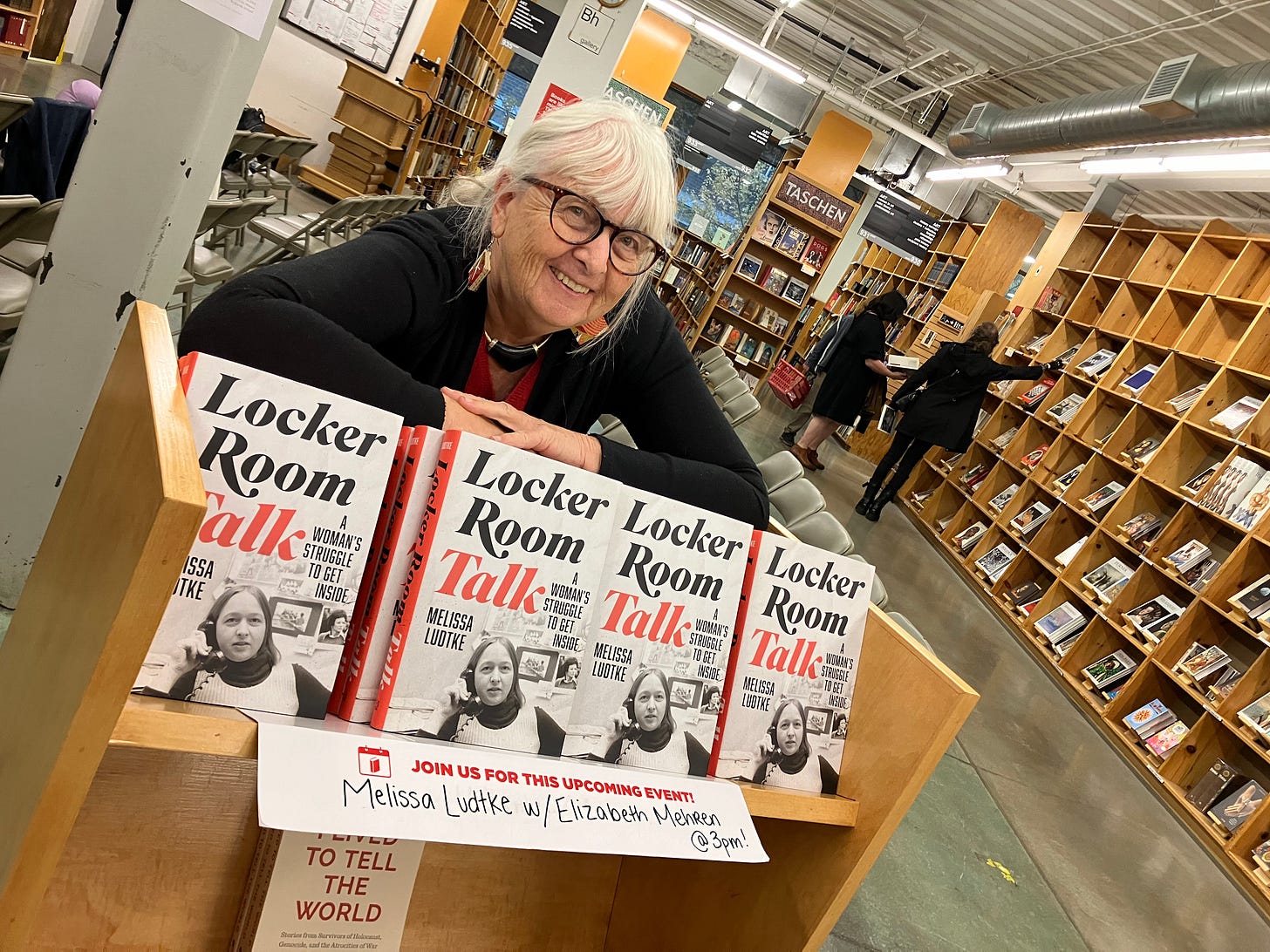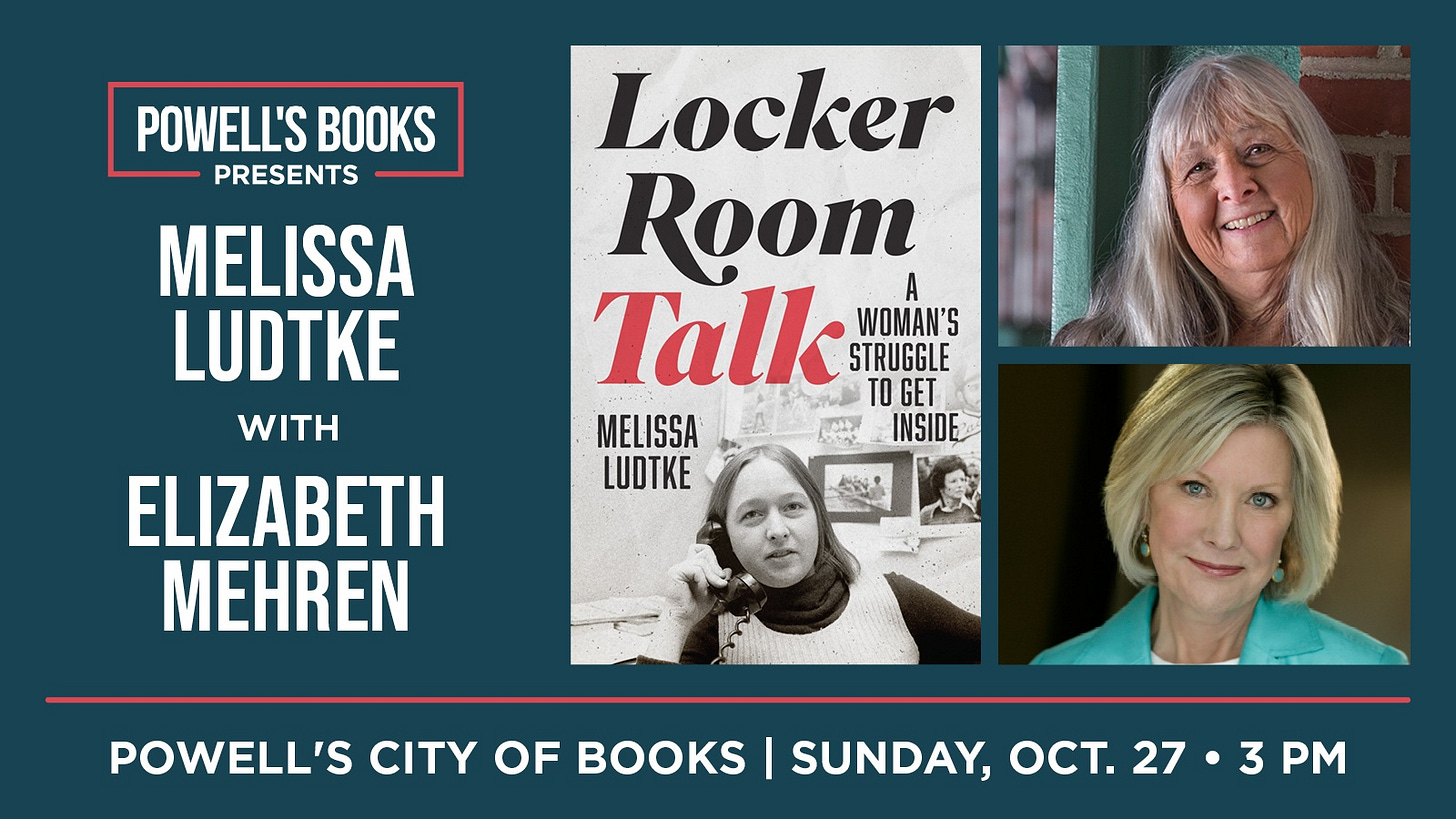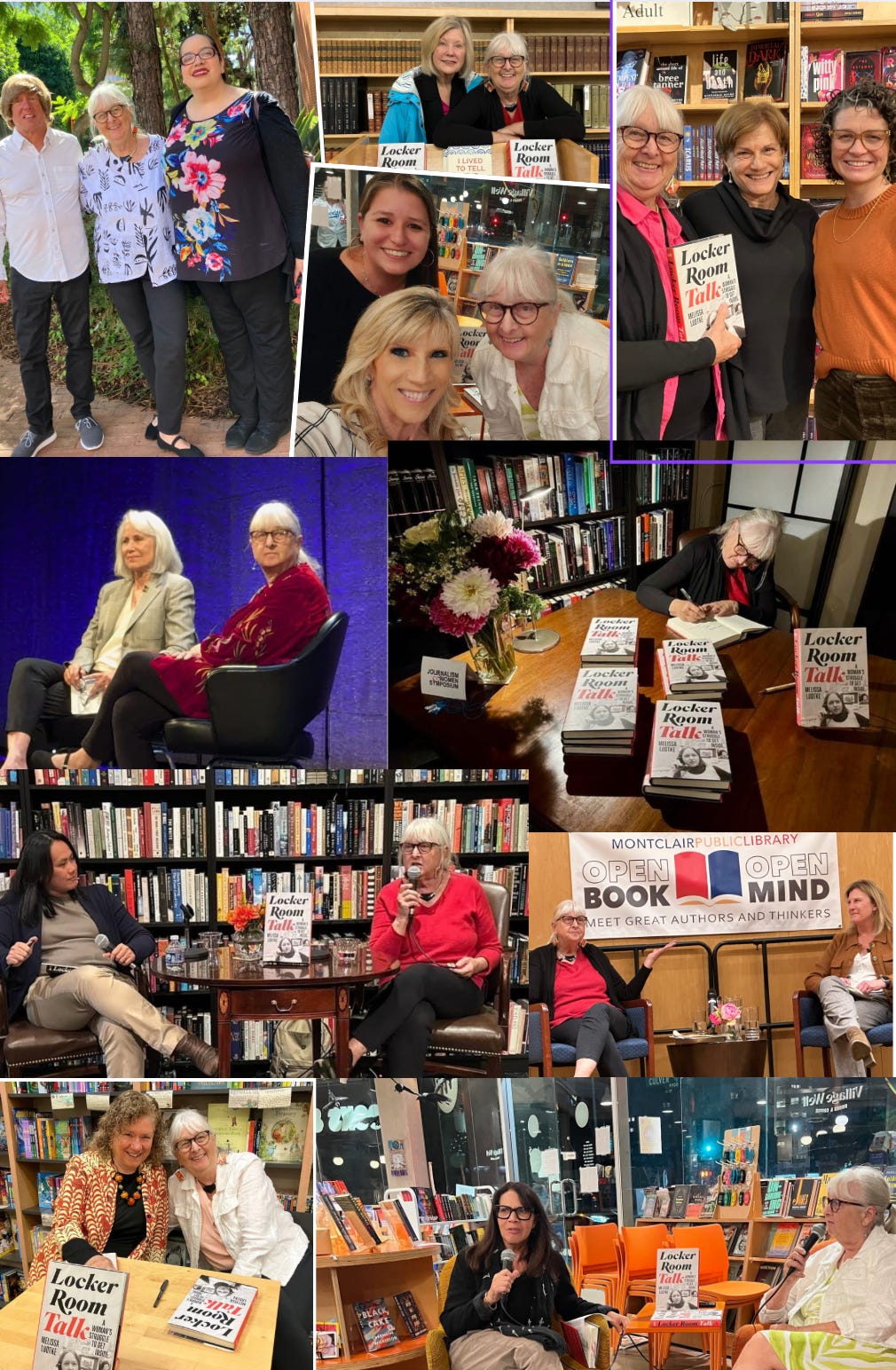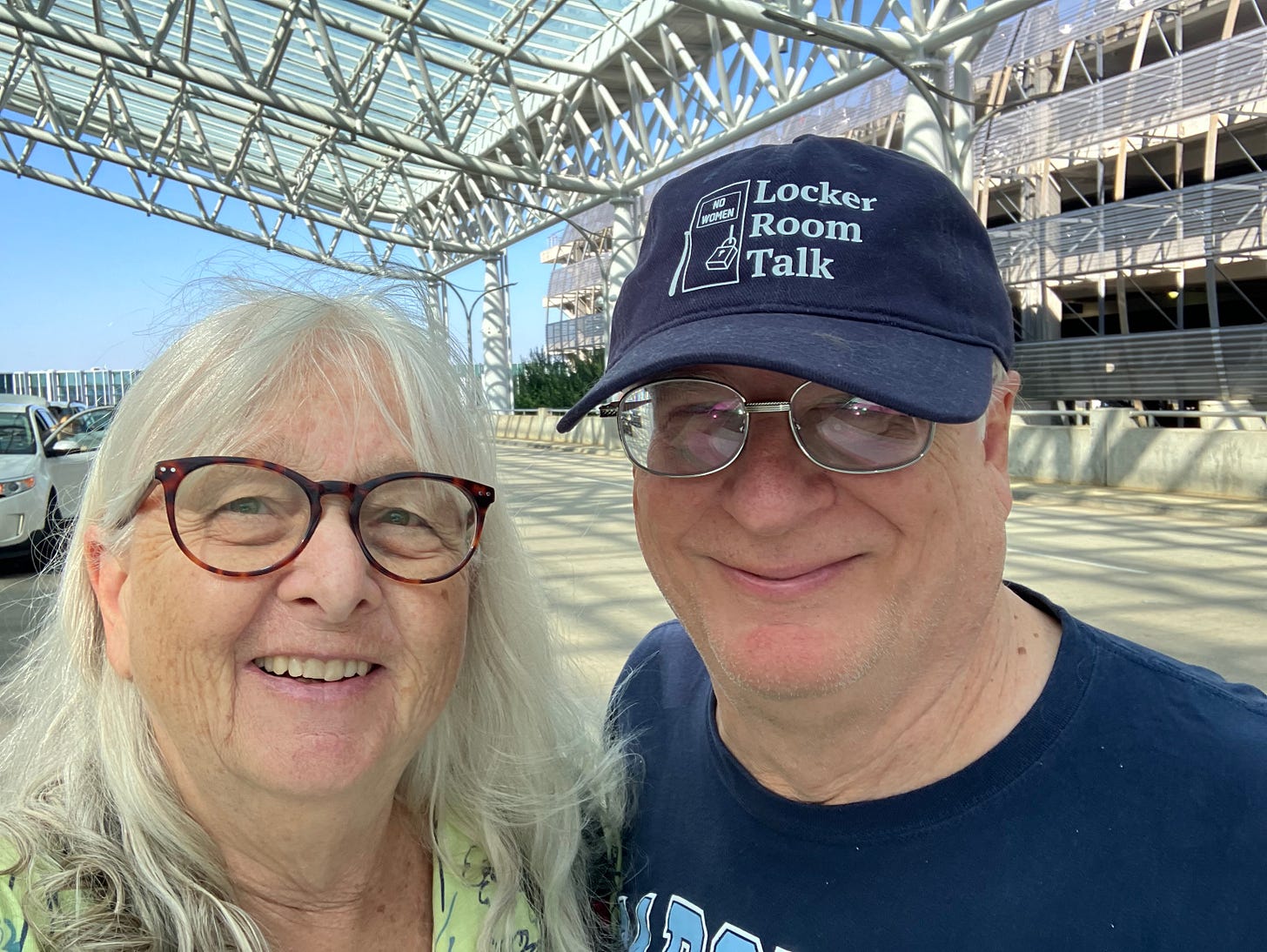Early one morning, midway through October, as leaves outside my Cambridge, MA window were bursting into brilliant reds, yellows and oranges, Head of the Charles rowers from around the world were packing suitcases to head to my city to row on my river, the Charles.
At home, I was packing to leave.
Once again, I’d be on the road telling stories from my book in the hope that I’d sell a few copies of Locker Room Talk that I’d labored a decade to research and write.
While I stuffed two-and-a-half weeks of clothes and shoes into a carry-on suitcase, my 14-year-old cat Cassie gave me her ornery eye which I didn’t need when a part of me already didn’t want to go. But earlier in 2024, anticipating my book’s publication in August, I’d committed myself to rigorous months of nearly non-stop book events. For some reason, I’d schedules my fastest-paced, cross-country trip in late October. Did I think that somehow I’d recharge my body’s energy supply with earlier events, sort of like hybrid cars refuel themselves with motion? Just before this, I had spent nearly a week in North Carolina with my stops cut from four to three when Hurricane Helene roared through Asheville a few days before I was going to talk there.
By the end of that week’s trip, I was exhausted.
With a few precious days at home in Cambridge, I taught a college class in Kansas via Zoom, did interviews for digital and radio stories, drove 90 miles each way to do an evening event in Western Massachusetts, spending most of my time firming up future book events and trying to arrange media hits along the way.
Truth be told, I’d been doing book events of all kinds - in-person, via Zoom or on the telephone – for eight weeks without building in a solid break. After one revitalizing row on the Charles and a few nights sleeping in my bed, I was heading out on the road for two and a half weeks and depending on the kindness of friends to take me in.
Leaning into friendships renewed along the way refueled me. At Powell’s in Portland, Oregon, my dear friend and fellow author Elizabeth Mehren joined me in conversation, as I looked out to see the welcoming faces of several other longtime friends who’d come to listen.
The Miles, The Money
17 days I spent on the road in mid-October logging thousands of miles by bus, train, plane, ferry, car and Lyft. From Cambridge I set off to New York City by bus – roughly 1/5 of what it cost on Amtrak, then to Montclair, N.J. by train, to Philadelphia by train, to Los Angeles by plane, to San Francisco (plane), Berkeley (car), Corte Madera (car), to Portland, Oregon (plane), to Seattle by train and Bainbridge Island on a ferry.
Finally, one Thursday night, after a nonstop flight from Seattle, Maya and Matthew greeted me at Logan and drove me home. Otherwise, I’d have added subway to my transport.
On that trip, I slept in nine different beds in friends’ homes in the two coastal time zones. My gift of being an amazing sleeper carried me through those transitions!
I flew over the nation’s heartland this time, but in 2025 I’ll make stops there.
I spoke at 13 different venues with a different moderator each time.
I podcasted – which must be a verb by now – from my temporary bedrooms, where I was also interviewed for radio and print stories. In Philadelphia, I taped a video sports show, spoke at the first Women in Sports Media Symposium at Temple University and did a book talk at that city’s stately downtown library. In Portland, Oregon, I tiptoed out of my friends’ home so as not to wake them for a live morning TV gig.
Along the way, I tried my best to keep up with emails and social media, while posting a few of my own.
And I paid my own way to do all of this after arranging the events and setting up my media opportunities.
When my literary agent heard the first hint of a whine from me, she assured me that mine is the customary experience for authors these days, even for those whose book contracts paid them five figures or more.
Mine did not!
To be clear, nothing about writing my book made financial sense. Certainly not the 10 years it took me to research my case, then write my book. Actually, I wrote two books, one of which I tossed out when I was nearing its end; I decided it was boring me to write it, and certainly would do the same to readers, but more importantly it wasn’t telling the story as I wanted told. So, I began again, never looking at any chapter I’d written before.
Moving through box after box of newspaper clippings and legal documents and reading lawyers’ memos and the case’s documents that surfaced in the discovery phase of the case took me almost an entire year. Absorbing and organizing reams of evidence that each side presented to the judge, along with consequential information contained in numerous affidavits and depositions, then vacuuming up the delicious minutia I found in hundreds of newspaper stories, cartoons and commentaries about me and my case proved essential and time consuming.
Then, I had to learn the law underpinning my case, its precedents and their history.
Let’s just say it’s fortunate I did none of this “for the money.”
By the time I took Locker Room Talk into the publishing marketplace, I’d written my book - twice. This is unusual since with most nonfiction books, the author submits a proposal of the book she intends to write, then uses the publisher’s advance to fund her research and writing. But in today’s marketplace, decisions about what books to publish reside even more than they used to with the publisher’s marketing people, not with editors. What I didn’t want to happen was for commercial marketers to tell me to center my book inside of locker rooms, which is where the 1970s male sportswriters had focused their coverage of my case.
In my view, the story I had to tell was the story that the men of the press in the 1970s had ignored - the one about my legal struggle for Major League Baseball to treat me as equal to my male sportswriter peers with its media policies and practices. I am the first to admit that the story I tell in my book is a whole lot less sexy than the men’s story about me was. Mine has less click bait but more historical context. So, I refused to have publishing marketers push me to repeat the men’s telling of my story so that sex, and not my equal rights legal case, would be my book’s focus.
In selling my book to Rutgers’ University Press — after more than 20 trade book publishers rejected it without even wanting to talk with me – I agreed to trim 60,000 words from my manuscript. With our contract signed, my payment for Locker Room Talk was 14 times less than the advance I was paid for my first book – bought with a short proposal and paid in 1992 dollars!
Lessons Learned
If you are not a “celebrity” author or an established author celebrated as a proven marketable commodity, deflate your expectations of what you’ll be paid for a book.
As neither a celebrity nor established author and being paid relatively little for my book, I still saw my book adventure through rose-colored glasses as I energetically set out to market Locker Room Talk. To do anything less felt as though I’d be admitting that my story doesn’t really matter when I believe it does.
I mean isn’t this effort one that any author with the means to do it would do after spending a decade gestating her book? Of course, actually doing this meant paying out of my own pocket for a book tour - paying for travel, conference fees, hotels, meals, and when an event was anywhere other than at a bookstore, I had buy my books in bulk, at a discounted price from the Chicago distribution center, then be sure those books got to each event on time. There, I’d sell them using apps on my iPhone while signing them, too.
This is why - loyal Substack readers - I call my book tour my friends’ tour. For without the magnificent hospitality of friends, I could not have afforded to make it happen. To pay for hotel rooms at events other than the conferences would have made my travel prohibitively expensive.
To all of you who put me up - and put up with me as a visitor in your home - YOU are the ones who made my book tour happen. And I am enormously grateful.
It’s on the Author, Now
Way back, at the start of 2024, as I looked ahead at the August publishing date for my book, I began arranging a vigorous, nationwide book tour, hoping for a lot of media attention along the way. I admit to having no real sense of all that would be required of me to make this happen.
You see, my past was not prologue.
My 1997 experiences with my first book, On Our Own: Unmarried Motherhood in America, published by Random House, spoiled me. Then, one of Random House’s numerous staff publicists organized my publicity tour filling my days with media availabilities and book events. Her detailed itinerary told me whom I would meet at airports, where this person would drive me, and printed out my flight and hotel reservations that were paid for by the publisher. Book reviews showed up in major newspapers, along with stories and columns.
My job, then: Show up on time.
My job, now: Do it all.
As we move from 1997 to my current tale, let us remember that in 1997 I was NOT a celebrity author and this was my FIRST book! I was an ordinary author with a top five publishing house.
Flash forward 27 years to this October’s road trip. I arranged all of my book events and media opportunities with months of preparatory work.1 Then, what happened on the road also bore little resemblance to my experience three decades earlier.
Two big reasons explain why; one, universal, the other, specific to me:
Since the 1990s, book publishing has experienced massive shifts, including mergers and acquisitions and downsizing, propelled by digital technology and economic forces, along with changing reader habits and book-buying practices. Mike Shatzkin, longtime publishing insider and digital-change observer, wrote about what this means for authors: “The view from here is that anybody who expects anything like a revival of traditional trade publishing, particularly one that provides a sizable number of authors with a real living, is going to be very disappointed.”
My 1997 book was published by a BIG FIVE book publisher; in 2024, Rutgers University Press, primarily a publisher of academic books, bought Locker Room Talk as a trade book. I am enormously grateful to Rutgers for its belief in and its support of my book, but the infrastructure and resources of academic publishers do not approach those of a major trade book publisher.
Two notes of gratitude:
Without supportive friends with comfy beds and comforters, my road trips would not have been possible. For starters, paying for a hotel room every night would have burst my piggy bank, and the prospect of this would have likely caused me to considerably pare back my travel. But even more than offering their beds to me, having friends to lend me emotional comfort at the start and finish of each day buoyed my spirits greatly, and that refueled my tank.
Without the steady hand of my remarkable literary agent Danielle Bukowski, who stayed by my side even after all hope for a major trade book publisher deal faded away, what happened next — signing with Rutgers to have my book published and taking it on the road, as I am doing, would not have happened, as it did.
Glimpses from the Road
Top row (left to right): Mickey Morabito, Melissa, Iliana Limon Romero (Los Angeles); Elizabeth Mehren and Melissa (Portland, Oregon); Amie Cuevas, Maria Serrao, Melissa (Los Angeles); Melissa, Linda Kramer Jenning, Maggie Mertens (Bainbridge Island)
Second Row (left to right): Lynn Povich, Melissa (New York Historical Society)
Third Row: Stefanie Loh, Melissa (Seattle); Melissa, Kelly Whiteside (Montclair, New Jersey)
Bottom Row: Connie Hale, Melissa (Berkeley); Karen Grisby Bates, Melissa (Los Angeles)
Wow, these friends of mine came through in ways large and small, and all they did to make these events sing gave me the lifts I needed — even when we spoke to two or three people who showed up to listen to us. Talk about staying humble — do all you can to arrange an event, convince a friend to moderate your talk, and show up to find two people waiting for you to speak.
And speak you do because two people took the time to come out to hear about your book. So, you speak as though there were hundreds of faces staring back at you, then maybe sign one book, and head to your home on the road. And there your friend is waiting, and suddenly those empty seats fade from view.
You pack your suitcase. And with a hug at the door, roll that suitcase to a waiting Lyft and off you go … your next destination, and who knows what awaits.
Welcome to my friends’ hour. May I see YOU or your friends along the way.
How about Locker Room Talk as a gift?
I’m seeing more people asking me to sign copies of Locker Room Talk: A Woman’s Struggle to Get Inside to a child or grandchild, a mom or grandmother. So, here’s an idea; think of purchasing my book as a holiday gift for someone special in your life. Or lots of special people by buying a copy to donate to your public school library?
As always, you can go to my book’s page on Rutgers University Press website, apply the code RUSA30 to receive 30% discounted price AND free shipping.
Here’s the new wrinkle: I’ve ordered special bookplates, so if you purchase a book and email me your mailing address, I will inscribe a bookplate to the person to whom your book will be gifted and send it to you to put in the book.
And if you think your special someone would prefer a Locker Room Talk baseball cap, well, we’ve got that, too. Click here, and choose your color, and presto, your cap will be on its way to you.
Me and Larry Keith, former baseball writer at Sports Illustrated in Charlotte, NC.
My publisher’s one publicist for all of its authors left in May 2024, 2 1/2 months before my book was released, and a new publicist didn’t arrive until my book tour had begun. This left tour planning and scheduling to me.








What great joy it was to have you with me in Philadelphia! I was so happy you were there and I was able to introduce you to my friend Claire. And thank you for all of your support and encouragement with my book. Means so much to me.
I waited since 1986 to hear your story. You did not disappoint. With the excitement of seeing you again but anxiety about driving to Philadelphia, I set out on the 2 hr drive from my home to a big city. I sat in the front row with wide eyes and open ears hanging on every word. I felt like a young woman attending her first rock concert, viewing my idol from center stage.
I continue to be awed by you. You are a gift given to me in 1986 and I am forever grateful.
I will be purchasing books as gifts and asking for book plates. I may even go so far as to purchase a 🧢.